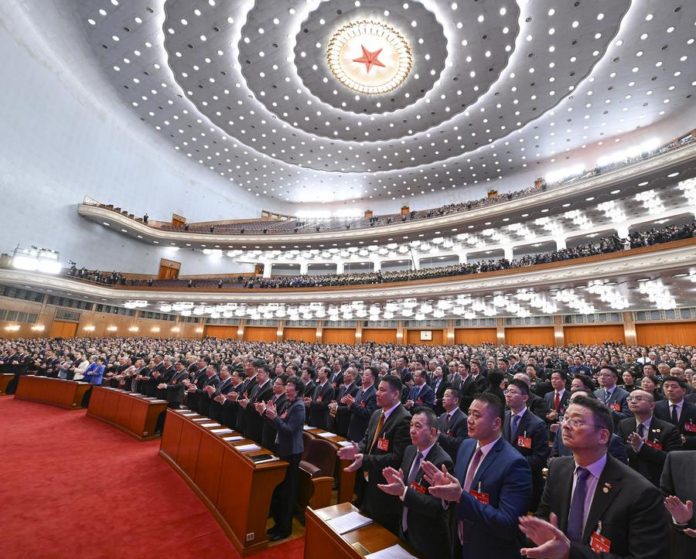
BEIJING (Xinhua) — China’s annual “two sessions,” a highly anticipated event on the country’s political calendar, began on Monday with the opening of the second session of the 14th National Committee of the Chinese People’s Political Consultative Conference (CPPCC).
As the world’s second-largest economy endeavors to solidify the momentum of economic recovery in its pursuit of Chinese modernization, the sessions carry immense significance for China and beyond.
Amid a solemn yet spirited atmosphere, the Great Hall of the People in the heart of Beijing welcomed more than 2,000 members of the CPPCC National Committee, the top political advisory body, from diverse sectors of society on Monday afternoon.
Xi Jinping and other Chinese leaders took their seats on the rostrum, in a nod of congratulations on the commencement of the event.
In his address, Wang Huning, chairman of the CPPCC National Committee, presented a work report to the session, saying in 2024 the CPPCC will focus on advancing Chinese modernization, actively offer suggestions and foster broad consensus.
The CPPCC aims to pool wisdom and strength so that the country will achieve the economic and social development objectives for the entire year, Wang said.
MAJOR POLITICAL EVENT
The “two sessions” refer to the annual sessions of the National People’s Congress (NPC), China’s top legislature, and the CPPCC National Committee. The NPC session is scheduled to open on Tuesday.
Taking place almost simultaneously in Beijing, the sessions will not only determine the national agenda for this year but will also have far-reaching implications that draw global attention.
The NPC holds the highest state power in China. A significant item on the NPC session’s agenda is the review of a government work report, which highlights past achievements and sets development targets for the present year and beyond.
During the upcoming session, NPC deputies will examine a draft development plan and budgets for the current year. Additionally, lawmakers are expected to deliberate a draft revision to the Organic Law of the State Council, apart from reviewing the work reports of the NPC Standing Committee, the Supreme People’s Court, and the Supreme People’s Procuratorate.
At Monday’s meeting, political advisors heard a report on the handling of their proposals since the previous session. Figures show that a total of 5,621 proposals have been submitted since the 2023 session, and of the 4,791 proposals filed, 99.9 percent have been handled.
They are also expected to participate as non-voting attendees in the NPC session, engaging in discussions on important documents, including the government work report.
Above all, Chinese legislators and political advisors play a crucial role in contributing to the country’s development by putting forth proposals and suggestions that are taken into careful consideration by relevant authorities. According to government figures, in 2023, departments under the State Council handled 12,480 suggestions and proposals submitted by NPC deputies and CPPCC National Committee members.
CRUCIAL YEAR
This year’s “two sessions” hold particular significance as 2024 marks the 75th anniversary of the founding of the People’s Republic of China and stands as a pivotal year for achieving the goals and tasks outlined in the 14th Five-Year Plan (2021-2025).
China’s economy rebounded in 2023, demonstrating solid progress in high-quality development. Gross domestic product grew by 5.2 percent, surpassing the initial target of around 5 percent. The country continues to be a vital engine of global development, contributing around 30 percent to world economic growth.
Looking ahead, the Chinese leadership has emphasized the importance of seeking progress while maintaining stability, and faithfully implementing the new development philosophy across all areas. Consolidating and strengthening the momentum of economic recovery is of utmost importance.
While challenges and difficulties remain in further promoting China’s economic recovery, the overall trend of recovery and long-term improvement remains unchanged. The “two sessions” are expected to foster consensus and enhance confidence in this regard.
HIGH-QUALITY DEVELOPMENT
Anticipation surrounds how the “two sessions” will focus on promoting high-quality development, seen as a crucial requirement for Chinese modernization. NPC deputies and CPPCC National Committee members are eager to contribute suggestions and proposals on “new productive forces,” a term highlighted in the economic work deployment of central and local authorities.
In the opinion of Yuan Yuyu, an NPC deputy and chairman of Medprin Regenerative Medical Technologies Co., Ltd. based in Guangzhou, this concept refers to advanced productive forces driven by innovation. The key emphasis lies in promoting high-level self-reliance and strengthening capabilities in science and technology.
This year also holds significance in terms of comprehensively deepening reform, with the primary task being the formulation of plans for more comprehensive reforms. This key message emerged from a meeting of the Central Commission for Comprehensively Deepening Reform in February.
The legislators and political advisors stressed the need to continue prioritizing reform measures that expand domestic demand, optimize economic structures, boost confidence, ensure people’s livelihoods, and prevent and defuse risks.
Stressing the importance of adhering to market-oriented reforms, Zhang Junkuo, a national political advisor and former deputy director of the Development Research Center of the State Council, underscored the need to leverage the government’s role effectively while ensuring the market’s decisive role.
Gao Zicheng, an NPC deputy and president of the All China Lawyers Association, highlighted the significance of private enterprises as vital driving forces for China’s high-quality development and active contributors to deepening reforms. He suggested the introduction of new regulations to promote the private economy’s development, thereby enhancing market confidence and vitality.
